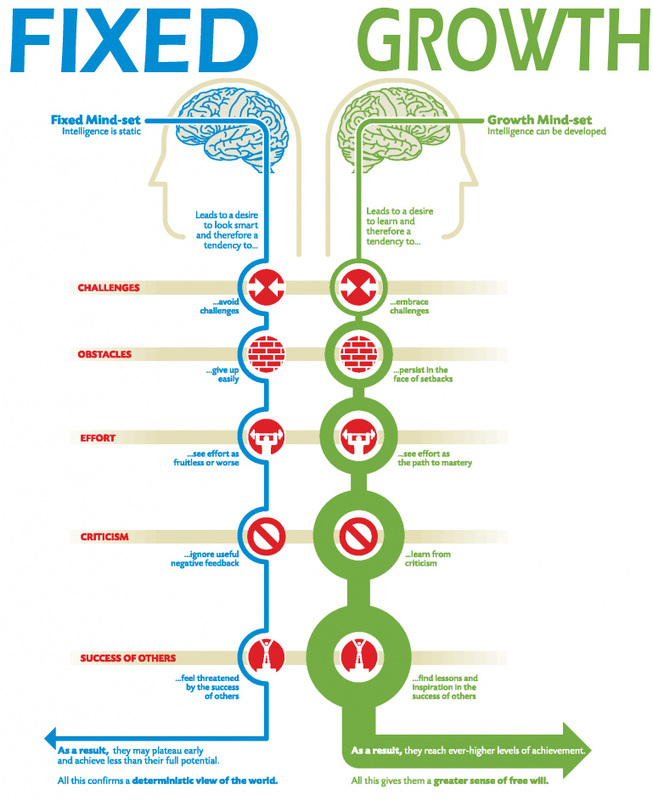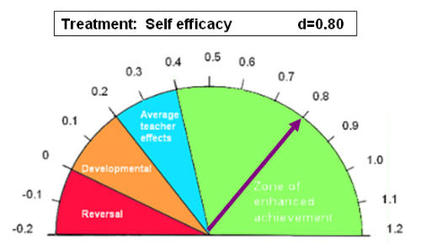Growth Mindset
|
Mindset Fixed - Growth
Carol Dweck’s Mindset- a powerful model for enhancing motivation Carol S Dweck is a psychologist working at Stanford University in the USA. For decades she has been researching into the field of achievement and success, and has created a new psychology of success based on Mindset. Dweck’s book and the ideas that it evidenced is hugely important to anyone involved in education, and should be considered a must-read. Dweck’s ideas, well supported by extensive evidence, provide a psychology that supports the value of formative assessment, and provides strategies that will enhance motivation and engagement in learners. What are Mindsets? Dweck’s research has allowed her to distinguish two perspectives that people hold about their abilities (with approximately 15% undecided). People can have different mindsets towards different aspects of their lives, e.g. a fixed mindset towards their ability to do maths, but a growth mindset towards their ability to play tennis. |
|
Fixed Mindsets:
Intelligence is fixed.Challenges are avoided, as to fail suggests that they ‘lack the intelligence’ required.Effort is seen as fruitless- if they don’t ‘get it’ then it suggests that they lack the intelligence.Getting things wrong and receiving feedback is negative- it reveals limitations.
Growth Mindsets:
Intelligence can be developed.Challenges are embraced as it is believed that they can improve at a task.Effort therefore is seen as worthwhile- a path to mastery.Getting things wrong and receiving feedback is positive- it guides further improvement.
Mindsets change the meaning of failure:
Failure, even for individuals who have a growth mindset can still be painful- but it doesn’t define you as a learner. Failure reveals problems that must be faced, dealt with and learned from. Failure should provide feedback and a solution to be followed.
Teachers have them too...
It’s not just learners that have Mindsets- we all do, including teachers. A teacher’s mindset can influence how they perceive the performance of learners. Fixed Mindset teachers see those that struggle or fail to understand an aspect of the curriculum as not being sufficient bright or talented in the subject.Growth Mindset teachers see struggling students as a challenge- learners in need of guidance and feedback on how to improve.
Mindsets can change
An extremely important finding of Dweck’s long research into Mindset is that the particular mindset a person has is not necessarily permanent. Mindsets can be changed. Note that her work shows that they can change in either direction.
Dweck reports that:
o Just by knowing about the two Mindsets, people can start thinking and reacting in new growth-orientated ways.
o Students benefit from being taught about the brain. Knowledge of how the brain makes new neural connections in response to learning provides them with a model of why effort and mastery-related practices lead to achievement.
o Achievement increased in studies that included control groups oSessions linked to Mindset-related learning led to measurable differences in motivation, engagement and effort levels.Praise-
Prop or poison?
Dweck has closely looked at the impact of praise, specifically the type of praise that learners receive. Her research has shown that praise linked to reassuring learners about their intelligence or talent is detrimental to their view about their abilities. It reinforces (fixed mindset) ideas that their achievements are a consequence of IQ or other finite innate ability. In Dweck’s work it led to students worrying that future tests might reveal their shortcomings, and that challenges were to be avoided as, again, struggling demonstrated that they weren’t really as smart as their teachers had believed.
Dweck’s research has demonstrated the importance of praise that recognizes effort. Praise that acknowledges process related activities such as practice, study, persistence and good strategies are proven to instil and develop a growth mindset in learners.
Dweck has closely looked at the impact of praise, specifically the type of praise that learners receive. Her research has shown that praise linked to reassuring learners about their intelligence or talent is detrimental to their view about their abilities. It reinforces (fixed mindset) ideas that their achievements are a consequence of IQ or other finite innate ability. In Dweck’s work it led to students worrying that future tests might reveal their shortcomings, and that challenges were to be avoided as, again, struggling demonstrated that they weren’t really as smart as their teachers had believed.
Dweck’s research has demonstrated the importance of praise that recognizes effort. Praise that acknowledges process related activities such as practice, study, persistence and good strategies are proven to instil and develop a growth mindset in learners.
|
Mindset: support for Hattie’s high effect size teaching strategies
Hattie’s high currency teaching strategies that show large effect sizes are the setting of challenging goals, active learning activities based around the application of knowledge, formative evaluation of how well students are progressing towards those goals, and rich feedback to learners about their errors and how they can mitigate for them. All of these, when examined through the lens of Dweck’s research into the impact of mindsets, illustrate the incredible value of instilling and supporting growth mindsets in learners. |
|
|
Marzano- ‘Self-efficacy’
An indication of the power of growth mindset can be gleaned from Marzano’s meta-analysis of studies into self-efficacy- teachers persuading students that if they try they can succeed.Petty (2009) indicates an effect size of d=0.80 for this, stating that it is most effective when students are actually working on the task, and when they are experiencing difficulty.I wonder what the effect size of such a strategy would be if you were to test it on a group of learners that you had previously identified as possessing solely fixed mindsets towards the activity they were involved in. |



